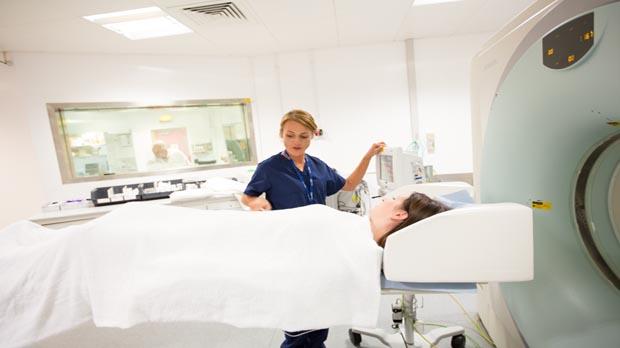
Last year in the UK over 60,000 cancer patients enrolled on clinical trials aimed at improving cancer treatments and making them available to all.
This study looked at whether using DW-MRI scans and PET scans during treatment for anal cancer can show how well treatment is working.
It was open for people to join between 2014 and 2017. The team published the results in 2019 and 2020.
Doctors often treat anal cancer with chemotherapy and radiotherapy at the same time. This is called chemoradiotherapy and often works well. But sometimes there are cancer cells that are resistant to radiotherapy.
Doctors hope that if they can find these areas of cells, they can give treatment directly to them. And that this will help stop the cancer coming back.
In this study, doctors compared diffusion weighted MRI (DW-MRI) scans before and during treatment. They wanted to find out whether these scans would be useful to show how well treatment was working.
They also looked at whether PET scans could be used to decide the area they should give a higher dose of radiotherapy to.
The main aim of the study was to look at the changes in these scans during treatment.
Study design
This study was for people who had recently been diagnosed with anal cancer. They were all due to have chemoradiotherapy.
They had DW-MRI scans and PET scans before they started treatment. And then part way through treatment.
DW-MRI scans measure the movement of water molecules in tissue. This is called diffusion. The pattern of diffusion is different in cancer cells compared to heathy cells.
The team looked at the pattern of diffusion on the scans before and part way through treatment.
Results
A total of 23 people had DW-MRI scans before and during treatment.
Four people’s cancer either didn’t go away with treatment, or started to grow again after treatment. These people all had similar changes in scan results.
The research team found that there was a possible link between the:
21 people also had PET scans before treatment and about 8 or 9 days later. The team found that the main area of cancer was in the same place on both scans. So they could use the scan done before treatment to decide where to give a higher dose of radiotherapy.
They suggest these scans are looked at more in a larger trial. They are working with researchers from other countries to plan trials. They hope to find out more about using scans in this way.
More detailed information
There is more information about this research in the references below.
Please note, these articles are not in plain English. They have been written for health care professionals and researchers.
A Prospective Study of Diffusion-weighted Magnetic Resonance Imaging as an Early Prognostic Biomarker in Chemoradiotherapy in Squamous Cell Carcinomas of the Anus
R Muirhead and others
Clinical Oncology, 2020. Volume 32, Issue 12, pages 874-883.
Is There a Role for an 18F-fluorodeoxyglucose-derived Biological Boost in Squamous Cell Anal Cancer?
A Sabbagh and others
Clinical Oncology, 2019. Volume 31, Issue 2, pages 72-80
Where this information comes from
We have based this summary on the information in the articles above. They have been reviewed by independent specialists ( ) and published in a medical journal. We have not analysed the data ourselves. As far as we are aware, the links above are active and the articles are free and available to view.
) and published in a medical journal. We have not analysed the data ourselves. As far as we are aware, the links above are active and the articles are free and available to view.
Please note: In order to join a trial you will need to discuss it with your doctor, unless otherwise specified.
Dr Rebecca Muirhead
CRUK/MRC Oxford Institute for Radiation Oncology
CRUK & EPSRC Cancer Imaging Centre in Oxford
Experimental Cancer Medicine Centre (ECMC)
Oxford University Hospitals NHS Trust
University of Oxford
Oxford Clinical Trials Research Unit
If you have questions about the trial please contact our cancer information nurses
Freephone 0808 800 4040

Last year in the UK over 60,000 cancer patients enrolled on clinical trials aimed at improving cancer treatments and making them available to all.